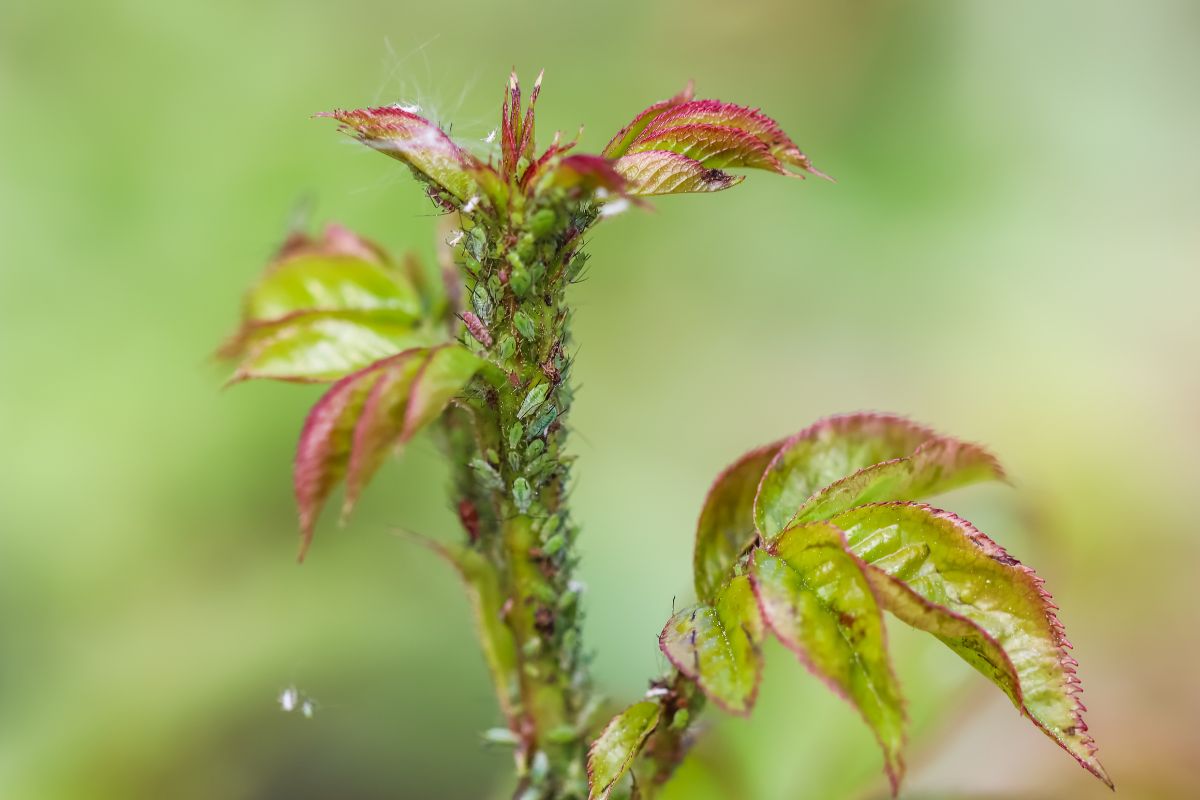Show table of content Hide table of content
Winter presents a golden opportunity for gardeners to protect their roses from spring aphid infestations. Expert gardeners understand that preventative measures during colder months significantly reduce pest problems when temperatures rise. This proactive approach aligns with the philosophy that small habits can lead to big changes over time, especially in garden maintenance. Let’s explore the simple yet effective winter techniques that keep aphids away from your precious roses.
The hidden winter threat to roses
Aphids pose a serious threat to rose bushes because of their remarkable reproductive capabilities. A single female aphid can produce hundreds of offspring within weeks, without requiring male fertilization. This exponential growth explains why waiting until spring to address the problem often proves too late.
During winter, aphid eggs remain dormant, nestled under bark and on rose stems. They patiently wait for temperatures to reach approximately 10-12°C before hatching. Once conditions become favorable, newly hatched larvae immediately attack tender buds, causing significant damage to developing roses.
Garden A simple cup at the base of your raspberry bushes – your harvest will double.
Early intervention remains crucial because aphid damage extends beyond cosmetic issues. These pests weaken plants by extracting vital sap and potentially spreading diseases between plants. Experienced gardeners develop highly observant habits, spotting potential problems before they escalate into major infestations.
The winter months offer a strategic advantage in pest management. Taking action during dormancy allows gardeners to implement gentler, environmentally friendly solutions rather than resorting to harsher chemicals later. This approach preserves beneficial insects while specifically targeting problematic pests.
Winter pruning and cleaning techniques
Late winter pruning serves as one of the most effective preventative measures against aphids. This practice eliminates potential breeding grounds while promoting healthier growth and abundant flowering in the coming season. Timing matters significantly – aim for the period just before new growth begins.
Start by removing dead, damaged, or diseased branches, as these frequently harbor aphid eggs. Thin out weak or overcrowded stems to improve air circulation, which naturally discourages pest populations. Make clean cuts at 45-degree angles approximately 1/4 inch above outward-facing buds to encourage outward growth.
Garden Why removing ivy from trees and facades could be the worst thing to do.
The area surrounding rose bushes requires equal attention. Thoroughly clear fallen leaves, pruning debris, and weeds from around the base of plants. These materials often contain aphid eggs or larvae ready to migrate upward once temperatures rise. Proper disposal of garden waste prevents reinfestation.
Soil maintenance plays an important role in aphid prevention. Gently loosen the soil around rose plants to disrupt any pests sheltering there, then apply a fresh layer of mulch. This protective barrier prevents both weed growth and provides fewer hiding places for pests.
Don’t overlook tool hygiene when moving between plants. Disinfecting pruning shears with isopropyl alcohol or a mild bleach solution between each rose bush prevents spreading potential diseases that might weaken plants and make them more susceptible to aphid attacks.
Protective winter treatments for roses
Dormant oil applications represent one of the most effective winter strategies against aphids. These specialized horticultural oils, often derived from mineral or vegetable sources, effectively smother overwintering eggs and larvae before they can hatch and cause damage. Apply on dry, frost-free days when temperatures remain above freezing but below 27°C.
Garden How a simple gesture can double your lemon tree’s harvest.
White oil, particularly those containing canola or mineral oil, works exceptionally well on dormant roses. The thin coating creates a physical barrier that asphyxiates eggs and prevents successful hatching. For optimal results, ensure thorough coverage of all stems, paying special attention to crevices and branch unions where eggs typically hide.
Timing applications correctly requires keen attention to detail. The ideal window occurs after pruning but before buds swell significantly. Once green tissue emerges, certain oils may damage delicate growth, so complete treatments while plants remain fully dormant.
Neem oil offers another effective option for winter treatment. This natural product contains azadirachtin, which disrupts insect growth cycles and repels feeding. When applied correctly, neem oil provides residual protection extending into early spring when aphid activity typically begins.
Beyond oils, winter also presents an opportunity to introduce beneficial microorganisms to soil around roses. Products containing mycorrhizal fungi enhance root strength, helping roses withstand pest pressure through improved nutrient uptake and overall vigor.
Garden This tree grows rapidly and transforms your garden into an oasis, even at 104°F.
Building natural defenses in your rose garden
Creating a diverse ecosystem around roses naturally suppresses aphid populations through biological competition. Companion planting serves as a cornerstone of this approach. Consider planting lavender, garlic, or marigolds near roses – their strong aromatic properties naturally repel aphids while attracting beneficial insects.
Installing insect hotels near rose beds encourages natural predators like ladybugs, lacewings, and parasitic wasps to establish residence. These beneficial insects serve as a first line of defense, controlling aphid numbers naturally without chemical intervention. Position these structures in sheltered locations facing morning sun for best results.
Winter represents the ideal time to amend soil with compost and organic matter. Healthy soil promotes robust plant growth, enabling roses to develop stronger natural defenses against pests. Plants with optimal nutrition withstand minor infestations without significant damage.
Early establishment of aromatic herbs like rosemary, thyme, and mint creates confusion for aphids through diverse scent profiles. This approach follows the concept of using intelligent strategies to improve relationships – in this case, the relationship between roses and their environment.
Garden This is exactly when you should water rose bushes, it helps prevent certain diseases.
Finally, develop a habit of regular inspection even during winter months. Checking dormant roses weekly allows early detection of any developing issues. When spring arrives, continue monitoring new growth closely, manually removing any aphids that appear before populations expand beyond control.


